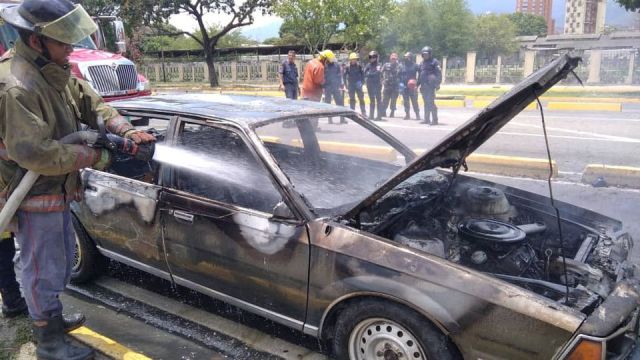
Baseball coach Adolfo Álvarez was traveling to a game with a group of children and their parents toward Venezuela´s northwestern city of Maracaibo, when the bus’ engine suddenly caught fire.
By Reuters – Mariela Nava and Deisy Buitrago
Jul 15, 2022
The blaze was caused by a fuel leak, according to firefighters, who say this has become increasingly common in Venezuela due to the rising cost of maintenance for autos, trucks and buses following years of economic turmoil.
So far in 2022, some 595 vehicles have caught fire, firefighters say. There were 590 such cases in all of 2021, according to the country’s mechanics’ association.
There have been no deaths from these fires, according to former vice president of civil protection of the central state of Carabobo, Jacobo Vidarte. But many of the incidents have led to injuries.
“I took a blow to the arm, but I’m fine. The children fortunately had no injuries, we were taken to the hospital, but we are fine and at home,” coach Alvarez said.
Experts say the fires are happening because people are delaying car maintenance, using unsuitable parts and tampering with fuel or fuel injection systems due to gasoline scarcity.
“There are many vehicles with maintenance faults,” said Luis Mantilla, chief of the fire department of the Santa Rita municipality, who participated in the rescue operation on a highway to Maracaibo.
“When they start moving, they generate these types of accidents,” he said, estimating that they had roughly tripled in the fourth quarter.
Despite slight improvements in the Venezuelan economy since the 2019 relaxation of currency controls and the broader adoption of the U.S. dollar, the country is still marked by extreme income inequality, limiting access to certain goods.
Due to low production, the Venezuelan vehicle fleet has aged, and most of the cars in circulation have exceeded their recommended life span, said Gino Fileri, president of the mechanics’ association.
“The country’s economic situation is leading people to Google how to remove the (fuel) injectors, assemble them, but they don’t have the knowledge, nor the experience, nor are they prepared, nor trained to do so,” added Fileri.
Meanwhile, vehicle production in the country is minimal after companies like General Motors Co (GM.N) or Ford Motor Co (F.N) abandoned or drastically scaled back operations in recent years. Imported cars remain beyond the reach of most Venezuelans.
The Ministry of Communication did not respond to a request for comment.
Firefighters and union spokesmen said Venezuelans needing emergency repairs are increasingly relying on inexperienced curbside mechanics that have popped up in several cities offering improvised part installations.
Unable to afford original car parts, people also tend to buy unsuitable ones sold in hardware stores, they added.
Repairing a car with partial engine damage can cost as much as $2,500, said Vidarte.
That amounts to a crushing blow in a country where the minimum wage is around $30 a month.
“Unfortunately we are living an economy in which people are looking for the cheapest,” said Angelo Sangregorio, the vice-president of the chamber of mechanical workshops.
“And the cheapest is not good.”
…
Read More: Reuters – In Venezuela, cars catch fire as maintenance becomes unaffordable
…